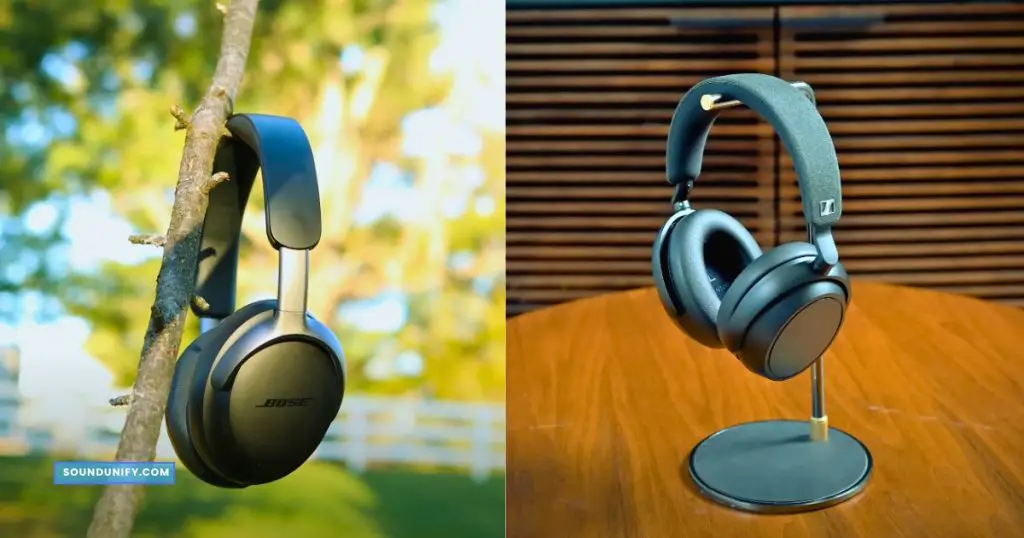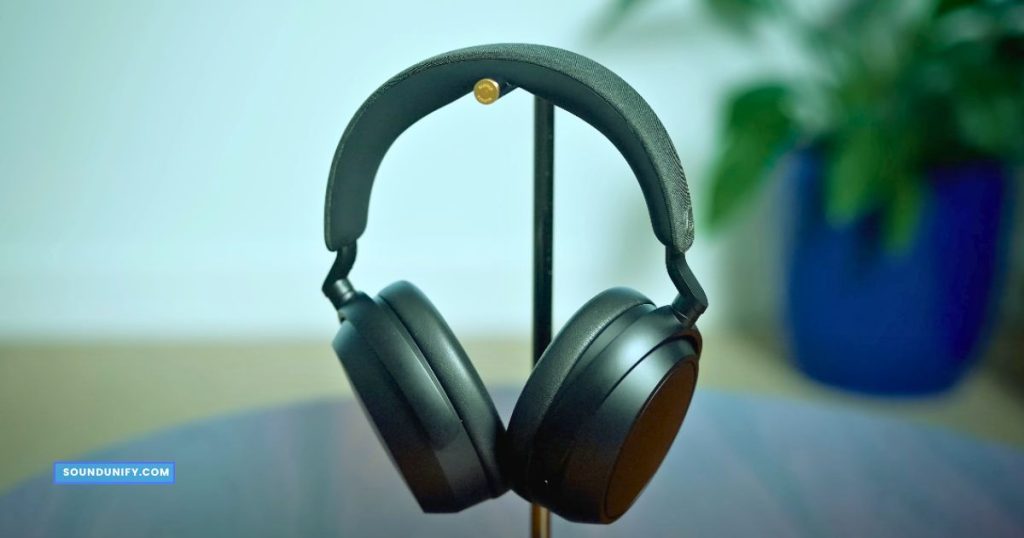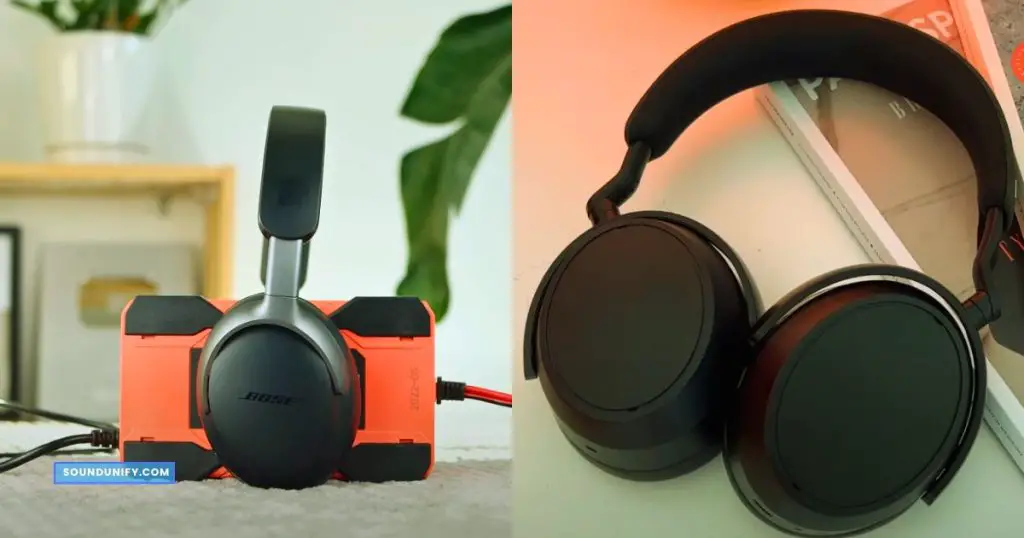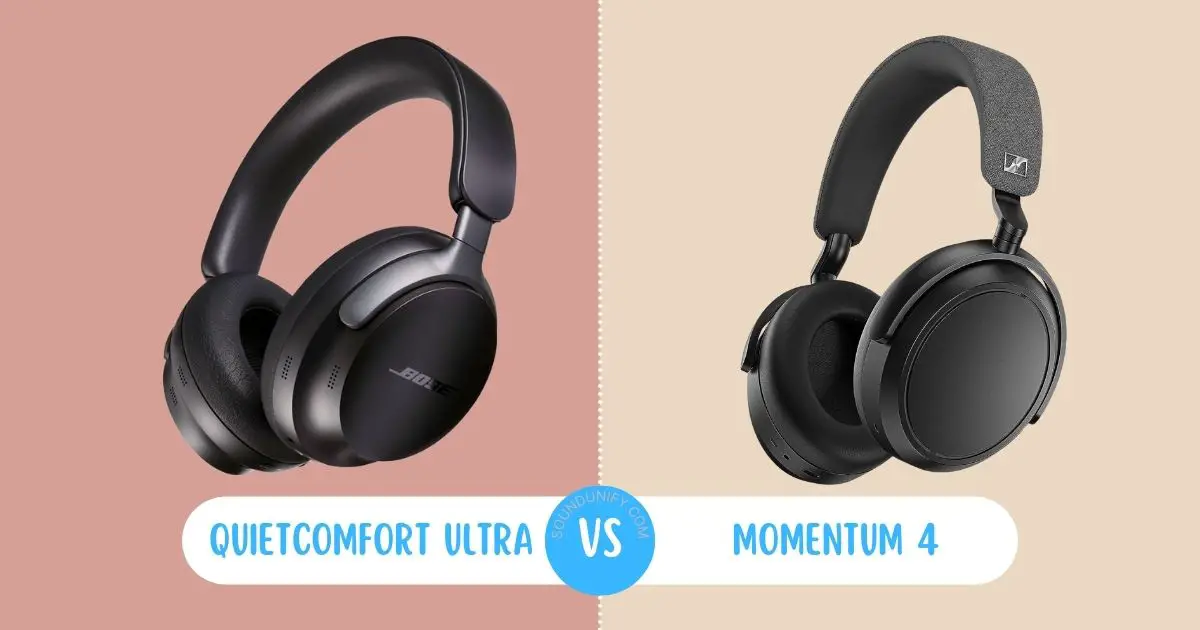In travel-friendly headphones, two giants stand out: Bose QC Ultra Headphones vs. Sennheiser Momentum 4.
Each boasts features that promise to enhance your journey, and choosing between them is anything but straightforward. At the heart of our comparison lies a crucial question: Which headphones are the best travel companion?
Let me paint a picture: you’re gearing up for a long-haul flight or diving into your work with a need for deep focus. The right headphones can be your best ally. Have you picked the Bose QuietComfort Ultra for its top-notch noise cancellation? Or lean towards the Sennheiser Momentum 4 for its astounding audio quality? It’s a tough call, I know.
I’ve been there, toggling between specs, reviews, and prices. And I get it. I am making the right choice matters. In this post, I’ll break down each aspect of these two audio giants – from comfort to sound quality and battery life to mic performance. Let’s find your perfect audio companion together!
| Feature | Bose QC ultra | Sennheiser Momentum 4 |
|---|---|---|
| Retail Price | Check The Best Price | Check The Best Price |
| Age | Newer model | About 1.5 years old |
| Carrying Case | Small and slim; automatic power-on feature | Larger with a lay-flat design; thicker |
| Design | Fully collapsible; mostly plastic ear cups | Swivel more than Bose; plastic with fabric top |
| Build Material | Metal arms; plastic headband with leatherette | Plastic arms; silicone padding under headband |
| Comfort & Fit | Looser fit; spacious, cooler ear pads | Firmer fit; spacious ear pads |
| Weight | 254 grams | 295 grams |
| Battery Life | 24 hours (18 with immersive audio on) | 60 hours |
| Charging Port | USB-C, no wired connection via USB-C | USB-C can be used as the wired connection |
| Connectivity | Bluetooth multi-device; SBC, AAC, aptX Adaptive | Bluetooth multi-device; SBC, AAC, aptX Adaptive |
| Sound Quality | Neutral, with an immersive audio option | Rich detail, impressive bass |
| ANC Performance | Blocks more noise; some cabin pressure | Slightly less noise blockage; less pressure |
| Ambient Mode | More natural; better wind noise rejection | Prioritizes environmental sounds |
| Microphone Quality | Natural, less robotic; better noise handling | Decent, but allows more ambient noise |
| Additional Features | Wear sensors; hybrid media controls | Wear sensors; touchpad media controls |
| Ideal Usage | Traveling, long flights | Extended listening, audiophiles |
1. Design and Build Quality

Diving into the design and build quality, the Bose QC Ultra and Sennheiser Momentum 4 stand ready to reveal what sets them apart.
Carrying Cases: The Tale of Two Homes
The Bose QC Ultra has a compact and slim case, perfect for minimalist travelers. A standout feature is its smart design, where the headphones automatically power on and connect to your phone when taken out.
However, this cleverness might backfire if you’re prone to tossing your headphones in a backpack, as they might unintentionally power on and connect.
In contrast, the Momentum 4 sports a bulkier case with a lay-flat design. It’s not as sleek, but it offers sturdy protection.
Aesthetics and Durability: More than Meets the Eye
Both headphones boast plastic ear cups with the ability to pivot and swivel. The Bose QC Ultra elevates this with a fully collapsible design, making it a hit for space-conscious travelers. The Momentum 4, while not as flexible, provides a greater swivel range, offering a bit more adaptability.
Headbands: The Subtle Difference
The headbands of both models glide smoothly for adjustment, but the Bose QC Ultra takes an edge with metal arms, enhancing its durability. Meanwhile, the Momentum 4 uses plastic arms but adds a touch of elegance with a fabric finish on the top.
Underneath the headbands, the Bose offers a padded leatherette for comfort, whereas the Momentum 4 uses padded silicone. This material difference could be a deciding factor for comfort seekers.
Both the Bose QC Ultra and Sennheiser Momentum 4 present their unique takes on design and build quality, each with features that cater to different preferences in comfort, durability, and style.
2. Comfort and Fit

When it comes to headphones, especially for travel, comfort is king. Let’s explore how the Bose QC Ultra and Sennheiser Momentum 4 stack up in this crucial arena.
- Starting with clamping force, a critical factor for long-wear comfort, both models are “big head approved.” However, the Bose QC ultra takes the crown for its looser fit. This makes them a prime choice for those with larger heads or for folks who like to don a hat while listening to their favorite tunes.
- The earpads on both models are generously spacious, easily accommodating most ear types and sizes. The Bose, however, goes a step further, offering more room and less contact with the skin. This design reduces heat build-up, a godsend for those long flights or extended listening sessions. In contrast, the Momentum 4, while comfortable, doesn’t quite match the Bose in this aspect.
- Weight is another crucial factor in headphone comfort; the Bose QC ultra shines again here. Weighing a mere 254 grams, they are noticeably lighter than the Momentum 4, which tips the scales at 295 grams. This difference, though small in numbers, is significant in experience. The lighter Bose headphones are easier to forget you’re wearing, making them ideal for those who want their music without the weight.
While both headphones offer commendable comfort and fit, the Bose QC ultra edge out with their looser clamping force, more spacious and cooler earpads, and lighter weight. They are, without doubt, designed with the comfort-centric traveler in mind. So, if you’re planning to cross continents or chill on a long commute, the Bose QC ultra might be your perfect travel buddy for comfort.
3. Technical Specifications

Exploring the technical specifications, let’s assess how the Bose QC ultra and Sennheiser Momentum 4 stack up. For tech enthusiasts, these details are often deal-breakers.
Battery Life: A Key Factor for Travelers
The Sennheiser Momentum 4 stands out impressively in battery life, with an advertised 60 hours of playtime with active noise cancellation (ANC). This feature ensures long-lasting enjoyment.
Conversely, the Bose QC ultra offers a 24-hour battery life with ANC, which reduces to 18 hours when using their immersive audio feature. For extended trips or sporadic charging opportunities, the Momentum 4 has a clear advantage.
Connectivity: Versatility in Use
Both models shine with multi-device Bluetooth connectivity, perfect for toggling between your phone and laptop. The Momentum 4 adds a bonus – its USB-C port doubles as a wired connection. While the Bose QC ultra is feature-rich, it misses out on this functionality. However, both maintain a traditional audio jack for wired listening.
Wireless Performance and Codec Support
When it comes to wireless performance, both headphones are formidable contenders, ensuring a seamless audio experience across various devices. They support popular audio codecs like SBC, AAC, and aptX Adaptive, which guarantees superior sound quality. iPhone users, however, should remember that they’re restricted to AAC due to compatibility limits.
The Sennheiser Momentum 4 lead the way in battery life and offer greater flexibility with their USB-C port. Although the Bose QC ultra don’t match up in battery longevity, they compensate with their strong connectivity capabilities. These specifications are vital in choosing the right headphone, especially if you’re constantly on the go or handling multiple devices.
4. Audio Performance
Audio performance is the heart and soul of any headphone, and in this department, the Bose QC Ultra and Sennheiser Momentum 4 each sing their unique tunes.
Starting with the Bose QC Ultra, they embody the essence of neutral sound. This means while they do pack some bass, it’s more about clarity than thump. Their bass is present but not overpowering, making them ideal for those who favor a balanced, vocal-focused sound profile.
Plus, with an adjustable EQ, you can tweak the audio to your liking. However, even with the bass dialed up, they don’t vibrate your head with deep lows.
The Sennheiser Momentum 4, on the other hand, is a different story. They stand out with their impressive instrument separation and detail. You don’t need special software or features to enjoy their rich sound quality.
If you’re a bass lover, the Momentum 4 won’t disappoint – they deliver a satisfying punch without compromising clarity or detail.
Bose steps up the game with its immersive audio feature, dramatically enhancing the listening experience. It brings vocals to the forefront and expands the soundstage, making it feel like you’re in the middle of a live performance. However, this comes at the cost of battery life, a trade-off worth considering.
If your preference leans towards a more neutral, balanced sound, the Bose QC ultra’s adjustable EQ and immersive audio are solid choices. But if you crave that extra kick in your bass and cherish fine audio details, the Sennheiser Momentum 4 will likely hit the sweet spot. Both sets of headphones offer distinct audio experiences, catering to different tastes and preferences in sound.
5. Active Noise Cancellation (ANC) and Ambient Modes

In the realm of headphones, Active Noise Cancellation (ANC) and Ambient Modes are game-changers, especially for travelers and commuters. Let’s see how the Bose QC Ultra and Sennheiser Momentum 4 perform in these critical areas.
Both headphones are at the top of their game with ANC. They effectively create a bubble of tranquility, blocking out a significant amount of external noise. This feature is a godsend in noisy environments like airplanes or busy city streets. The Bose QC ultra, however, has a slight edge.
They can block out more noise overall compared to the Momentum 4. However, there’s a catch: the Bose can induce some cabin pressure, which some might find uncomfortable during long listening sessions.
The Momentum 4, while blocking slightly less noise, exerts less cabin pressure, offering a more comfortable experience for sensitive ears.
These two differ significantly in the Ambient Mode or transparency mode. Both allow you to control the amount of external noise you let in, but the Bose QC ultra takes the lead regarding natural sound and wind noise handling.
Their ambient mode is particularly impressive in its naturalness, making it easier to engage in conversations without taking off your headphones. On the other hand, the Momentum 4 seems to prioritize environmental sounds over voices, which might not be ideal for all users.
A unique feature of the Momentum 4 is its conversation mode, which lowers the music volume and enhances ambient sound with a tap, allowing for quick chats. Surprisingly, the Bose lacks this feature, which is a miss for those who appreciate the convenience of seamless interaction without removing their headphones.
Both the Bose QC ultra and Sennheiser Momentum 4 excel in ANC, making them top picks for noise-sensitive users. The Bose stands out with its superior noise blocking and more natural ambient mode, while the Momentum 4 offer a more comfortable experience with less pressure and a handy conversation mode. The choice depends on your preference for either more effective noise cancellation or greater comfort and conversational ease.
6. Microphone Quality and Call Performance
In today’s interconnected world, headphones are not just for music but also essential tools for communication. Evaluating the Bose QC ultra and Sennheiser Momentum 4 regarding microphone quality and call performance is thus crucial.
General Call Quality
Both headphones offer decent microphone quality, making them suitable for phone calls in quiet environments. The Bose QC ultra edge out with a more natural and less robotic sound quality, enhancing the feel of real-life conversations. This particularly benefits those who frequently engage in calls or virtual meetings.
Performance in Noisy Environments
The real challenge for headphone microphones is their performance in noisy settings. Here, the Bose QC ultra excels, effectively reducing background noise such as road clamor or chatter.
This capability ensures that the listener hears your voice. In comparison, while still decent, the Sennheiser Momentum 4 tends to let more ambient noise through during calls.
The Impact of Noise Handling
This variance in noise handling is significant for users who often take calls outdoors or in bustling environments. The Bose QC ultra’s ability to filter out external noise makes it great for music listening and boosts its functionality as a communication device.
The Bose QC ultra stand out for those needing headphones that can adeptly handle calling needs in various environments. Their superior microphone performance ensures that your voice remains clear and prominent, regardless of your surroundings. Conversely, the Sennheiser Momentum 4 are a reliable choice for quieter settings or if call performance is a secondary concern. They maintain their competence as an all-around capable pair of headphones.
Final Thoughts: Bose QC Ultra Headphones vs. Sennheiser Momentum 4
After an in-depth analysis of the Bose QC Ultra and Sennheiser Momentum 4, it’s clear that each headphone excels in its unique way, making the choice between them dependent on your specific needs and preferences.
The Bose QC ultra is the go-to choice for the avid traveler or someone who spends a lot of time in noisy environments. Their superior active noise cancellation, lighter weight, and more comfortable design make them ideal for long journeys.
The bonus of a more natural-sounding microphone and effective noise handling in calls makes them a versatile option for music enjoyment and communication.
However, if battery life and sound quality are your top priorities, the Sennheiser Momentum 4 shines bright. With an impressive 60-hour battery life and a rich, detailed sound profile, they’re perfect for audiophiles who don’t want to compromise audio quality.
Their comfortable fit and less cabin pressure also make them a great choice for extended listening sessions, although they fall slightly short in ANC and call performance compared to the Bose.
James Dimento is a Chief-in-Editor of SoundUnify. He is a headphone enthusiast and creative writer passionate about audio technology. He has three years of experience writing about headphones and sound quality and is responsible for creating reviews and taking care of all administration.
